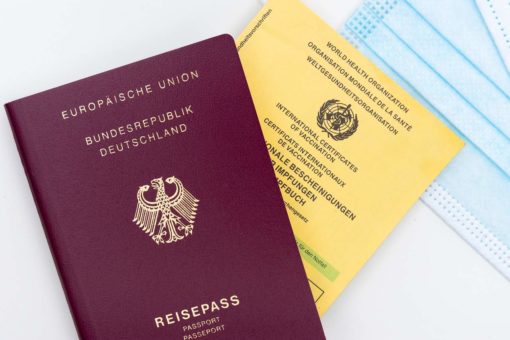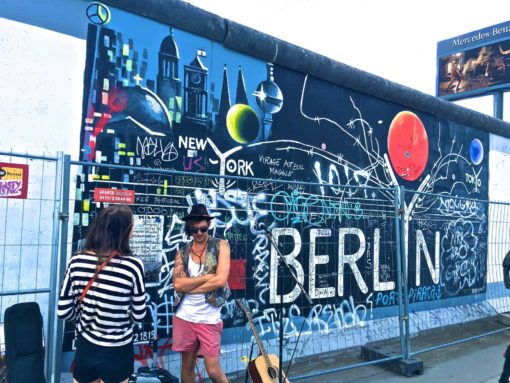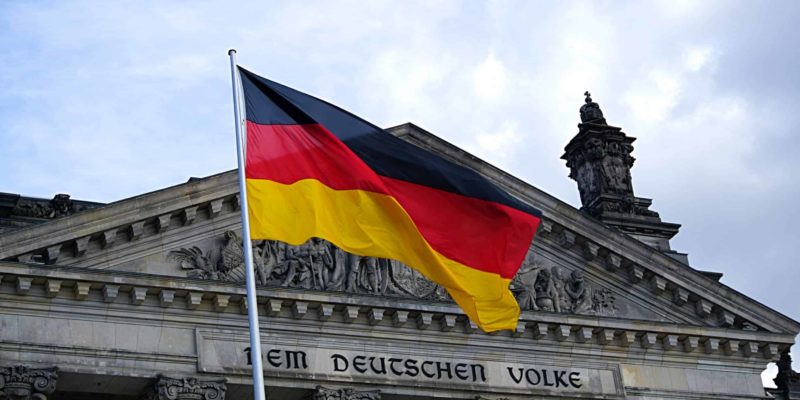Update: As of June 11, 2022, proof of vaccination, proof of convalescence or proof of testing is no longer required for entry into Germany. However, entry restrictions may be applied for areas of variants of concern. You can find more information on the official website of the German Federal Foreign Office.
Like other European countries, Germany continues its battle against COVID-19.
Even though stringent entry restrictions remain in place, Germany’s borders are open for travellers from all over the globe.
Germany is full of wonderful museums, royal palaces and spectacular natural landscapes that just want to be discovered.
With as many as 25,000 castles that bear witness to its history, Germany is the best place to visit if you have your heart set on embarking on a unique cultural journey and experiencing a taste of history.
If you want to marvel at old master paintings, powder-soft sandy beaches, one of the 350 health spas and resorts, Schinkel‘s fascinating architecture, and many other wonders, all you need to do is come to Germany.
Here is everything you need to know about the current travel restrictions and requirements.
Table of contents:
- Travelling to Germany during COVID-19: The basics
- Germany: COVID-19 travel rules and entry requirements
- How to use the COVID-19 digital green certificate in Germany
- What happens if you test positive for COVID-19 while visiting Germany?
1. Travelling to Germany During COVID-19: The Basics

Many travellers are currently wrestling with inconsistent COVID-19 guidelines across Europe, let alone the misleading travel information scattered all over the Internet.
Each Schengen country has the final say on what its entry restrictions are for foreigners crossing its borders.
Therefore, keeping up with constantly changing travel restrictions seems more daunting than ever. That’s why the Visas Association‘s team of experts is glad to give you a helping hand by providing you with comprehensive information regarding the travel rules currently applicable in Germany and helping you get a clear idea of the country’s border restrictions.
Before applying for a Schengen Visa for Germany, please be aware that:
- Germany’s travel requirements may NOT be the same as the travel requirements applicable to other European countries. As a traveller, you must familiarise yourself with the laws currently in place in all European countries you will travel to or transit through.
- When applying for your Schengen Visa for Germany, you may be required to submit your COVID-19 related certificate (of full vaccination or previous infection) with your application.
- The usual travel rules related to your Schengen Visa (e.g., Visa validity and duration of stay) apply regardless of the COVID-19 travel restrictions.
With that in mind, let’s take a more in-depth look at Germany’s travel requirements during the COVID-19 pandemic.
2. Germany: COVID-19 Travel Rules and Entry Requirements

Germany classifies countries as “high-risk” and “virus variant of concern” countries. The official website of the Robert Koch Institute shows which country falls into which category.
High-risk countries are countries with a high number of COVID-19 cases (for example, countries with more than 100 infections per 100,000 inhabitants during the last seven days). High-risk countries are also countries with a high rate of spread, high hospitalisation rate, or insufficiently available or reliable epidemiological data.
Virus variant countries are countries where COVID-19 mutations cause more severe disease or higher mortality. Germany’s virus variant areas list currently does not include any country.
As of October 22, 2021, the following countries are considered to be high-risk areas:
Albania, Antigua and Barbuda, Armenia, Barbados, Belarus, Belize, Bosnia and Herzegovina, Brunei Darussalam, Bulgaria, Burundi, Cameroon, Congo Republic, Costa Rica, Croatia
Cuba, Dominica, Egypt, El Salvador, Estonia, Ethiopia, France (French Guiana and New Caledonia), Gabon, Georgia, Grenada, Guatemala, Guyana, Haiti, Iran, Ireland (Border), Israel (including the Palestinian territories), Jamaica, Korea (Democratic People’s Republic), Latvia, Libya, Lithuania, Malaysia, Mexico, Moldova, Mongolia, Montenegro, Myanmar, Netherlands (Aruba, Curaçao, Bonaire, Sint Eustatius, Sint Maarten, Saba), Nicaragua, North Macedonia, Papua New Guinea, Philippines, Romania, Russian Federation, Saint Kitts and Nevis, Saint Lucia, Saint Vincent and the Grenadines, Sao Tome and Principe, Serbia, Seychelles, Singapore, Slovenia, Sudan, Suriname, Syrian Arab Republic, Tajikistan, Tanzania, Thailand, Trinidad and Tobago,Turkey, Turkmenistan, Ukraine, United Kingdom of Great Britain and Northern Ireland (including all British Overseas Territories, Isle of Man and the Channel Islands), United States of America, Uzbekistan, Venezuela, Vietnam, Yemen.
If you have stayed in a high-risk country or a virus variant country in the last 10 days, you must self-isolate when arriving in Germany (10 days if you arrive from a high-risk country and 14 days if you arrive from a virus variant country).
Make sure you fill in a digital entry registration form (you can access it here) and have the confirmation of your registration with you in electronic form (PDF) or printed out on paper when you arrive.
All of your documents, whether a COVID-19 vaccination certificate, recovery certificate, or negative swab test, must be provided in German, English, French, Italian or Spanish.
If you enter Germany from a high-risk country
If you have stayed in a high-risk country in the last 10 days and entered Germany, you may end the 10-day quarantine period:
- After 5 days – If you submit via the entry portal of the Federal Republic of Germany (www.einreiseanmeldung.de) a pre-departure negative PCR test taken within 72 hours prior to arrival or a rapid antigen test taken within 48 hours prior to arrival.
- Immediately – If you submit via the entry portal of the Federal Republic of Germany (www.einreiseanmeldung.de):
– Proof that you have taken the COVID-19 vaccine (EU Digital COVID-19 certificate or WHO vaccination booklet). At least 14 days must pass since receiving the second shot of a two shots vaccine or the shot of a one-shot vaccine. Please note that the certificate of completion of the vaccination cycle must include one of the four accepted vaccines: Pfizer BioNTech, Moderna, AstraZeneca/Oxford, Johnson &Johnson/Janssen.
or
– Proof of recovery from COVID-19 (a positive PCR test result carried out at least 28 days but no more than six months previously).
For children under 12 years, self-isolation ends automatically after 5 days.
If you enter Germany from a high-risk country, exceptions from the requirement of testing or providing proof of immunity apply if:
- You only change flights at the airport
- You’ve spent less than 24 hours in a high-risk or virus variant country
If you enter Germany from a virus variant country
If you have spent time in an area of virus variant of concern, you must submit a negative COVID-19 test result at the end of your 14-days quarantine.
You must also take a pre-departure negative PCR test within 72 hours prior to arrival or a rapid antigen test within 24 hours prior to arrival. Proof of vaccination or evidence of recovery is not sufficient.
For travellers arriving from virus variant countries, the quarantine period cannot be shortened. However, if your virus variant country of departure is reclassified as a high-risk area during your quarantine, the regulations for high-risk areas apply. In this case, the quarantine may end earlier, as explained previously.
If you enter Germany from a virus variant country, exceptions from the requirement of testing or providing proof of immunity apply if:
- You only change flights at the airport
- You’ve spent less than 24 hours in a high-risk or virus variant country
If you enter Germany from a country that is NOT a high-risk or virus variant country
If you have stayed in a country that is not a high-risk or virus variant country in the last 10 days, you are allowed to enter Germany without the need to self-isolate if you submit:
- Proof that you have taken the COVID-19 vaccine (EU Digital COVID-19 certificate or WHO vaccination booklet). At least 14 days must pass since receiving the second shot of a two shots vaccine or the shot of a one-shot vaccine. Please note that the certificate of completion of the vaccination cycle must include one of the four accepted vaccines: Pfizer BioNTech, Moderna, AstraZeneca/Oxford, Johnson &Johnson/Janssen.
or
- Proof of recovery from COVID-19 (a positive PCR test result carried out at least 28 days but no more than six months previously).
or
- A pre-departure negative PCR test taken within 72 hours prior to arrival or a rapid antigen test taken within 48 hours prior to arrival.
3. How to Use the COVID-19 Digital Green Certificate in Germany

Many German states have introduced rules that allow restaurants and other leisure facilities to prohibit entry to those who are unvaccinated and can’t show proof they have recently recovered from the coronavirus disease.
Germany divides into 16 Federal Autonomous States, which form the Federal Republic of Germany. Each Federal State can establish its own COVID-19 rules and regulations. This approach differs from other European countries, which have had a more centralised approach to preventing the spread of the pandemic.
Depending on the German state you travel to, you may be required to present a certificate of completion of the vaccination cycle or certificate of recovery to:
- Enter restaurants and bars
- Attend events (e.g., congresses, concerts, shows, etc.) outdoors and indoors
- Enter museums and places of culture
- Access swimming pools, spas, and gyms
- Participate in festivals and trade fairs
We also recommend you check out the current information about restrictions according to the Federal State you will be visiting.
4. What Happens If You Test Positive for COVID-19 While Visiting Germany?

If you develop COVID-19 symptoms while on holiday in Germany, start isolating yourself at home or hotel immediately and notify all your recent contacts.
Arrange to take a test at a nearby centre. If you test positive for COVID-19, the laboratory or test centre informs the local health authority (Gesundheitsamt) that supervises your self-isolation for up to 14 days.
You may also call one of the following phone numbers:
- Federal Ministry of Health corona hotline: 030 346465100
- Emergency telephone number for the treatment of patients: 0800 0117722
- Emergency medical service: 116117
There are no concrete guidelines on the type of accommodation you need to self-isolate. The local health department will give you specific instructions and information.
The German government does not cover the costs for the accommodation during your quarantine period. However, some tour operators and international health insurance policies may cover these expenses.
Conclusion: If you love cobblestone streets, picturesque towns and fairy-tale castles, Germany is a beautiful country with unquestionable charm and should definitely be your go-to destination.
However, before planning a trip to Germany, please be aware that the list of high-risk countries compiled by the Robert Koch Institute is constantly updated. It is therefore essential to find out before you travel whether your country of departure is considered a high-risk area or a virus variant area.
At Visas Association, we know that the most overwhelming part of planning a trip is figuring out how to enter the country. With slow bureaucratic processes and confusing entry requirements, submitting a successful application can be a huge hassle. Contact us, and we will make your Schengen Visa application a breeze! Our 100% FREE consultation makes travel simpler and more accessible and helps you find answers to all of your questions on the spot.
